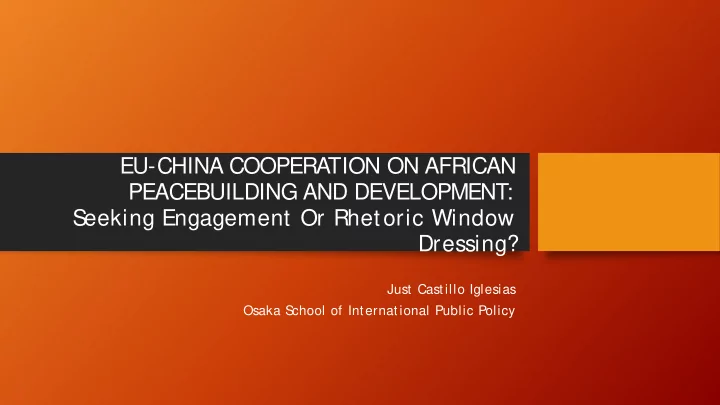

EU-CHINA COOPERATION ON AFRICAN PEACEBUILDING AND DEVELOPMENT: S eeking Engagement Or Rhetoric Window Dressing? Just Cast illo Iglesias Osaka S chool of Int ernat ional Public Policy
Outline • Two external actors in Africa: China and the EU • What are the implications for African peacebuilding, development? 1. The EU and China in Africa • What are the characteristics / aims of their respective involvement • To what extent are these conflicting or converging? • The case of Angola 2. Frameworks for Multilateral Cooperation Africa-China-EU • Do these initiatives respond and take into account needs of African countries and societies? • Or on the contrary, are they framed solely within EU-China competition? Proxy competition
The EU in Africa • Former colonial ties continued engagement in peacebuilding and development • The EU itself, has become a strong player in Africa as an ODA donor, peacekeeping operations and EP A frameworks of trade. • EU approach is characterized by conditionality: democracy, human rights, good governance, etc. • A ‘ moralistic’ approach that, however, is often criticized by its rigidity and lack of effectiveness in delivering actual results
China in Africa • China, on the other hand, is a relatively new player in Africa • But with a strong and increasing presence • ‘ No strings attached’ policy in line with China’s foreign policy principles no conditionality, absolute respect for ‘ internal affairs’ • The practices of China in Africa are often described as successful and having a significant impact, as it does not face significant competition from other actors
The EU and China in Africa • As a result , a debat e has emerged: what approach can bring more benefit s t o Africa? EU, China, Bot h in combinat ion, none? • China’s ‘ no st rings’ soft power proj ect ion, sout h-sout h rhet oric • Y et it delivers infrastructure, very tangible material wealth. • But how good is t his? China port rays European approach as old-fashioned, excessively int ervent ionist in domest ic affairs, and as ineffect ive in cont ribut ing t o Africa’s prosperit y. • EU holist ic approach: securit y + development • China development (business) + sovereignt y • Meanwhile, African demands on China are on t he rise and European act ors face increasing pressure • What new engagement beyond ODA can Europe t ake?
China and EU policies towards Angola • Angola has become one of China’s main trading partners in Africa • China has gained strong presence through oil credit lines, and is engaged in the country’s reconstruction (housing, infrastructure, etc.) and minor programs on Civil S ociety promotion • But the early honeymoon seems to be over: Angola’s criticism on China’s practices, quality of infrastructure, and concerns raised by the Chinese community in the country have increased • Turbulent past: China FMLA links during S ino-soviet split • Arms trade has continued • Although: China is engaged actively in peacebuilding proj ects such as de- mining
China and EU towards peacebuilding in Angola • The EU articulates it’s Angola policy through the Cotonou Agreement and the 2009 bilateral Partnership Agreement • EU declares ‘ good governance’ and ‘ political dialogue’ as priorities strong reticence towards EU in Angolan political elite • Mainly ODA through government, and some support to S MEs, NGOs, etc. • Facing problems: limited administrative capacity, corruption • EU’s approach could be increase effect iveness by focusing on healt h, j ust ice administ rat ion, et c. • EBA framework t owards LDCs • Lack of t rust and knowledge • More pragmatic Chinese engagement reveals the challenges faced by the EU’s approach • However a point to consider: does the Chinese ‘ no string attached’ approach contradict directly the EU’s approach? Is there some room for combination?
Africa-China-EU Trilateral Dialogue and Cooperation • In line with the seemingly growing competition between the EU and China on Africa, the EC proposed in 2008 a Trilateral framework of cooperation and dialogue • S till at a planning stage • Envisioned obj ectives: • reinforcing security and support for peacekeeping operations; • developing affordable and sustainable infrastructures to reinforce interconnectivity and regional integration. • protection of the environment and management of natural resources within a context of economic and commercial growth. The Commission proposes to cooperate with the African Union (AU) and African countries in order to promote sustainable management, technology transfers and investments; • the increase in agricultural production, the quality of production and food security, in particular with a view to meeting the obj ectives of the Comprehensive Africa Agriculture Development Program.
Africa-China-EU Trilateral Dialogue and Cooperation • Not enthusiastically welcomed by either Africa or China, although potential benefits do exist • S tage-0 flaws: • The potential of African partners is underlooked from the beginning • No African ownership • Chinese reticence to engage EU’s way of multilateralism • S imilar proj ects existed, already with the same flaws • EU-Japan dialogue on African Development (1 yearly meeting) • On the other hand, were it conceptualized correctly, the EU-China-Africa could raise ownership of African partners in the processes of Peacebuilding, development and ODA Management.
Debate point # • From Africa, how are these initiatives received? • Potential assessment of benefits? • Or it j ust sets the increasing EU-China competition on a number of global issues in an African scenario? • What kind of engagement is more welcome? • S uggestions and proposals
Thank you for your attention!
Recommend
More recommend